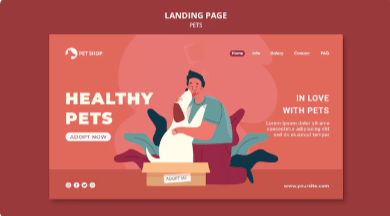When it comes to protecting your pet’s health, pet insurance is a helpful option. It provides financial support for unexpected medical expenses, giving you peace of mind. However, not all pet insurance plans are the same. The two most common types are comprehensive and accident-only pet insurance.
Choosing the right plan depends on your pet’s needs, your budget, and how much coverage you want. In this article, we will compare these two types of insurance and help you decide which one is right for you and your furry friend.
What is Accident-Only Pet Insurance?
Accident-only pet insurance covers injuries caused by accidents. This includes situations like:
Broken bones from a fall.
Injuries from a car accident.
Bites from other animals.
Poisoning or swallowing foreign objects.
This type of plan does not cover illnesses, routine check-ups, or preventive care. It is designed to provide financial support for emergencies caused by accidents.
What is Comprehensive Pet Insurance?
Comprehensive pet insurance provides broader coverage. It usually includes:
Accidents: Injuries from accidents, just like an accident-only plan.
Illnesses: Treatment for conditions like infections, cancer, or allergies.
Preventive Care (Optional): Some plans offer add-ons for routine care, such as vaccinations, dental cleanings, and wellness check-ups.
Comprehensive plans are more expensive than accident-only plans, but they offer more protection for a wide range of health issues.
Cost Comparison
The cost of pet insurance depends on factors like your pet’s age, breed, and location. However, accident-only plans are usually cheaper than comprehensive plans.
Accident-Only Plans: These typically cost between $10 and $25 per month.
Comprehensive Plans: These can range from $30 to $100 or more per month, depending on the coverage and add-ons.
If you are on a tight budget, an accident-only plan might be more affordable. On the other hand, a comprehensive plan offers better value if you want extensive coverage.
Coverage Differences
Here is a detailed comparison of what each plan covers:
Type of Coverage Accident-Only Comprehensive
Injuries from accidents ✔ Yes ✔ Yes
Illnesses (e.g., infections) ✖ No ✔ Yes
Chronic conditions ✖ No ✔ Yes
Preventive care (optional) ✖ No ✔ Sometimes
Surgery and hospitalization ✔ Yes ✔ Yes
If your pet is generally healthy but prone to accidents, an accident-only plan might be sufficient. However, if you want to be prepared for both injuries and illnesses, a comprehensive plan is the better choice.
Advantages of Accident-Only Insurance
Affordable: Accident-only plans are more budget-friendly, making them a good option for pet owners who want basic coverage.
Simple Coverage: These plans are straightforward and focus only on accidents, so there is no confusion about what is covered.
Emergency Support: They provide financial help for unexpected accidents, ensuring your pet gets care right away.
Disadvantages of Accident-Only Insurance
Limited Coverage: Accident-only plans do not cover illnesses or preventive care. If your pet gets sick, you will have to pay for treatment out of pocket.
No Chronic Care: Conditions like arthritis or diabetes are not included, which can lead to high costs over time.
Less Peace of Mind: You might still worry about affording medical care if your pet becomes ill.
Advantages of Comprehensive Insurance
Extensive Coverage: Comprehensive plans cover both accidents and illnesses, providing all-around protection for your pet.
Chronic and Preventive Care: Some plans include options for managing chronic conditions and routine care, helping you stay on top of your pet’s health.
Peace of Mind: Knowing that most medical expenses are covered allows you to focus on your pet’s well-being.
Disadvantages of Comprehensive Insurance
Higher Cost: These plans are more expensive, which might not fit every pet owner’s budget.
Complexity: Comprehensive plans can have exclusions or limits, so it’s important to read the fine print carefully.
May Not Be Needed: If your pet is young and healthy, you might not use all the benefits of a comprehensive plan.
How to Decide Which Plan is Right for You
When choosing between accident-only and comprehensive pet insurance, consider the following factors:
Your Pet’s Health History:
If your pet is healthy and young, an accident-only plan might be enough.
If your pet has a history of illnesses or is older, a comprehensive plan is a better choice.
Your Budget:
If you want affordable protection, choose an accident-only plan.
If you can afford higher premiums, invest in a comprehensive plan for better coverage.
Your Pet’s Lifestyle:
Active pets that love to explore may benefit from accident-only insurance.
Pets that are prone to illnesses or have specific health risks need comprehensive coverage.
Peace of Mind:
If you want to be fully prepared for any health issue, choose a comprehensive plan.
For those willing to take their own illness burden, accident-only plans are really worth the savings.
Real-life situations-
Accident-only insurance: Imagine it is your pet dog, running out in front of a moving vehicle. Insurance which covers for accidents will have upraised bills while rushing your dog to emergency surgery and any other treatment, but if the pet were to develop diabetes, those charges would be out of your pocket.
Accident only plan for those willing to shoulder their own illnesses, but will definitely save from costs.
Real-life cases-
Insurance against accidents: Think: there is a dog, running out from behind a parked moving vehicle. Accident only insurance would cover costs incurred after rushing the dog for emergency surgery and other procedures, but if the dog suffered from diabetes, cost incurred would be out of pocket.
Full Insurance: Now, let it be that your pet cat develops urinary tract infections, or developed kidney disease, which is usually common among the senior members of the feline community. Of course, even for an ideal plan, it would have entailed the obvious prescription and continuing treatments done for maintenance. It will also cover accidents, like if your cat falls and breaks a bone.
Conclusion
Accidents-only pet insurance is what most of the pets require and the respective pet owners are financially stable, it is difficult to make such a decision of specific accident-only pet care for the pets concerned and then come to a subjective conclusion.
Accident-only plans cover immediate emergencies without much financial impact, and are thus best for healthy and active pets. Comprehensive covers both accidents and illnesses, and is best when one desires full coverage and does not mind having to pay more in premium.
Before making such a decision, one has to analyze his pet’s health, his financial status or budget, and the extent of coverage level desired. Most importantly, remember that pet insurance is just another investment in the health and happiness of your pets. No matter which plan you choose, it will help a lot later at the time of dire need.



